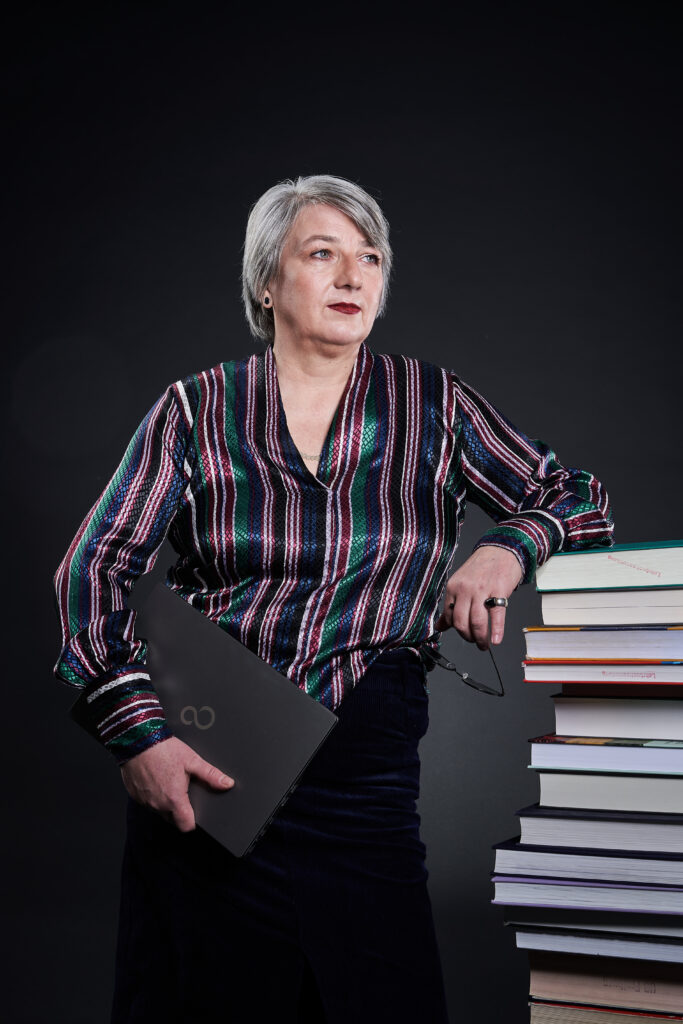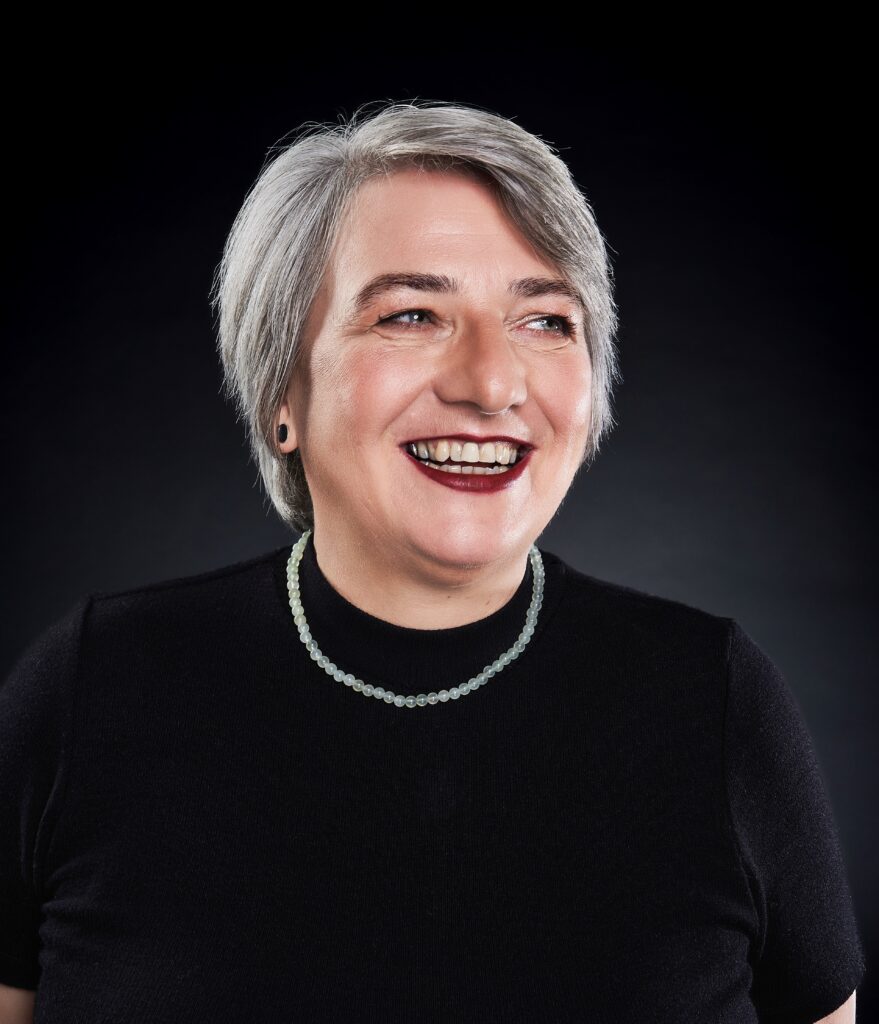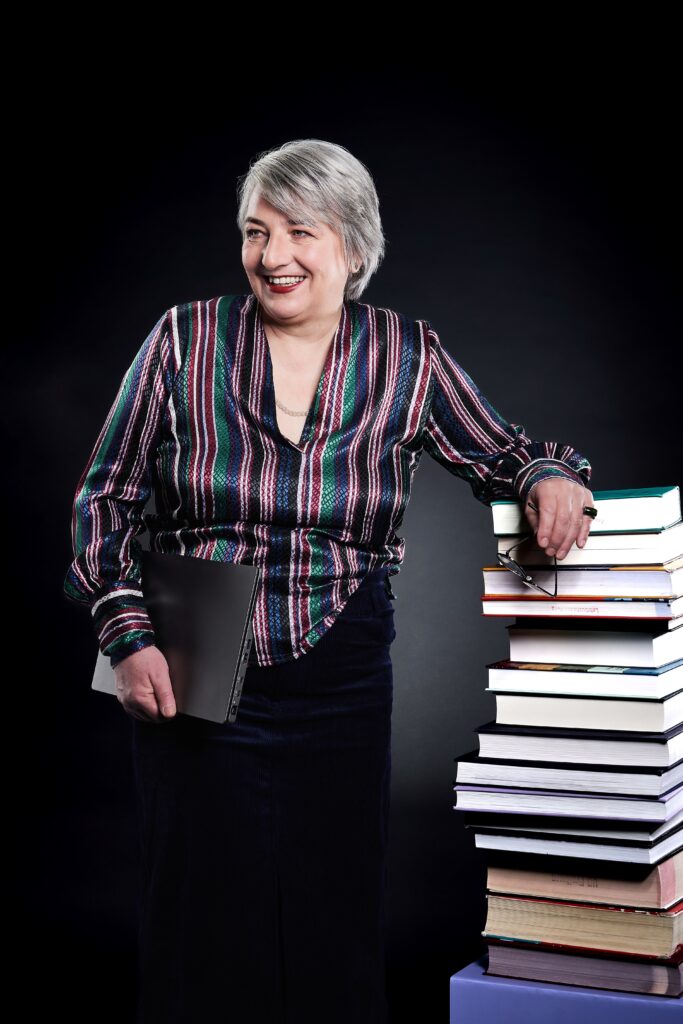
Author:
Leah Bohr completed her Bachelor’s degree in English Studies and Cognitive Science at the University of Freiburg and is now getting her Master’s degree in Cognitive Science in Tübingen. When she’s not working or programming, you can usually find her in the gym or outside on her pink bike. Despite her workaholic tendencies, she knows how to enjoy relaxing evenings on the balcony with home-grown tomatoes. She owes her Spanish skills largely to anime subtitles.


Proust, Voltaire & Emojis
Eva Erdmann thinks books are embarrassing. Not always, of course, not everywhere, but today she does. Those who know her well would not believe it. Eva Erdmann? The Romance studies lecturer, who takes the time to compile the literature for her seminars in the library at the beginning of the semester so lovingly? Is she truly, this lover of literature, to find books embarrassing? Never. However, when Eva Erdmann arrives for her photo shoot and she sees the stack of books we have set up for her as a backdrop, she cannot help but roll her eyes. Our approach is classic pigeonholing, she declares. Those of us who thought she would bring a thick book as an accessory are miles off the mark. Rather than a copy of Voltaire, she pulls out a laptop. Literary studies, which include her own subject, are far too often seen as outdated, extinct, irrelevant. Eva Erdmann cannot and will not embody this stereotype. Her focus is on the future: readiness for the coming change, letting go of outdated ways of thinking, providing a breath of fresh air in the lecture hall.
What would the future be without a certain degree of flexibility? Obviously, worth little. The students in Eva Erdmann’s courses are surprised by her style at least as much as we are. With ease, she adapts her vocabulary, opening her courses to a wide variety of cultural and linguistic backgrounds. She jumps from German to French and, in the next sentence, to Spanish, without having to bend over backwards. When she gave her online seminars from the sunny Mensa garden at the start of Corona, her students could only grin. If anyone can pull off a cool move like that, it is definitely Eva Erdmann.
We talk a lot about communication and the difficulty of finding common ground in conversations. “I’m really bad at expressing myself,” she says in an aside. Of course, I have to follow up on that. Surely, someone who can quote Proust from cover to cover – and probably in several languages – will be able to find the right words? It depends on the medium, she explains. A WhatsApp group with 15 people is much more difficult to handle than a colloquium. And what are the appropriate emojis for the occasion anyway? The transition between a novel that no one reads, decorated at most with a sad thumbs-up, and a brash “Okay,” as many a lazy writer likes to send, is difficult to navigate, even for a literary scholar.
Apart from that, Eva Erdmann knows her way around tricky situations. She has one of the few permanent positions in the academic mid-level faculty at the Romance Studies Department in Freiburg. With the real circumstances firmly in mind – appointment lists filled with male first names, no female role models in the professorships of a typical women’s subject, the artificially prolonged adolescence of the so-called young academics -, Eva Erdmann once opted for a secure and fulfilling mid-level position. The fact that teaching and research belong together is particularly convenient for her, as she believes that teaching literature and questions of literary studies are a part of science as well. A permanent mid-level position is also a lottery, but one that Eva Erdmann does not regret – her students, especially young women like me, do it for her.
Although not distinguished by this title, Eva Erdmann is the kind of person many would like to have as a professor. With her, there are no outdated slide sets where not even the year has been updated, not the same three old male authors who are supposed to represent the literary canon year after year. But that’s not all. She understands the frustration of students. One teacher for every 100 students – how is that supposed to work, please? Feedback comes – if it comes at all – only in the form of a brief comment; individual attention or concrete feedback are not possible with such a staffing. The university as a place of knowledge and knowledge transfer thus really only functions mediocrely, and Eva Erdmann, with Cervantes in one hand and her laptop in the other, sometimes also sees herself as on a sinking ship.
In addition to her work as a lecturer, she is an active member of the international research group “Crime Fiction Group”, which has its headquarters in Ireland. Between complex analyses of the spaces and places of popular crime novels, she tries to solve the case of how my French ancestry allows me such poor mastery of the language. However, her investigation only leads her to an astonished “Ah, pourquoi?” – unfortunately, that’s all there is to this sleuthing. Not every mystery can be solved by literary science.
So, does Eva Erdmann really find books embarrassing? Not always, of course, not everywhere, but when it comes to pigeonholing, she absolutely does.







